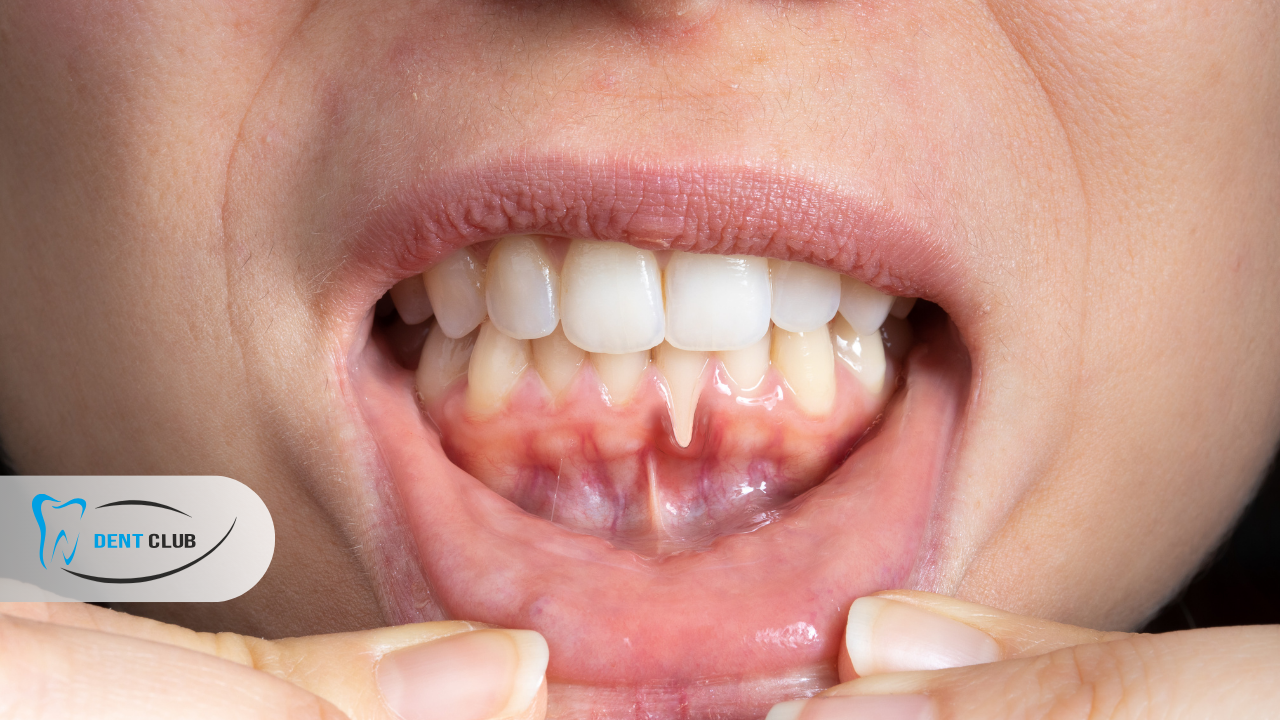Receding Gums: Is Treatment Still Possible? Everything You Need to Know for a Healthy Smile
Hello dear friends, a big hello from the Dent Club family, the architects of your smile! Today, we’re going to delve into a topic that many of us ponder, sometimes overlook, but is actually critical for our oral health: gum recession. If questions like “My gums are receding, is this permanent?”, “Is there a treatment?”, “Did I wait too long?” are swirling in your mind, you’re in the right place! Don’t worry, because with the right approach and expert hands, overcoming this problem is absolutely possible. Let’s explore this seemingly complex, yet resolvable issue together.
What is Gum Recession? Why Do Our Teeth Seem to Appear Longer?
Gum recession, as the name suggests, is the condition where gum tissue pulls away from the tooth surface, exposing the tooth roots. Normally, our gums hug our teeth like a blanket, protecting them. But when this blanket pulls back, the root surfaces of the teeth, which should normally remain beneath the gum line, become visible. This condition causes your teeth to “look longer than normal”. Besides aesthetic concerns, this recession can lead to serious problems like tooth sensitivity, increased risk of cavities, and even tooth loss. Therefore, gum recession is not just an aesthetic issue, but also a serious health concern.
So, What Are the Secrets Behind This Recession? Why Do Our Gums Recede?
There are many different reasons why our gums might suddenly decide to “pull back.” Often, it’s a combination of multiple factors rather than a single cause. Let’s take a closer look at the most common reasons:
- Incorrect and Aggressive Toothbrushing Techniques: Yes, you heard that right! As important as brushing our teeth is, how we brush them is just as crucial. Brushing too hard with a stiff-bristled toothbrush or applying too much pressure to your gums can act like an abrasive, gradually damaging gum tissue and leading to recession. You can think of it like “erasing” your gums. That’s why you should always use a soft or medium-bristled brush and brush gently with circular or slightly angled motions.
- Gum Diseases (Periodontitis): Our Bacterial Nemesis! One of the stealthiest and most significant causes of gum recession is gum disease, especially periodontitis. When oral hygiene is not sufficiently maintained, a sticky film of bacteria called plaque accumulates on the teeth and below the gum line. This plaque hardens into tartar. Tartar, with its rough surface, provides an ideal environment for more bacteria to build up. These bacteria lead to inflammation in the gums (gingivitis). If gingivitis is left untreated, the inflammation spreads to deeper tissues and begins to destroy the bone and connective tissues that support the teeth. This is where periodontitis comes into play, and the gums start to recede as if to escape the infection. This is essentially the body’s defense mechanism against the infection.
- Genetic Factors: Is It Our Destiny? Unfortunately, some things might be written in our genes. If there’s a history of gum recession or gum problems in your family, you might be more prone to it. This could be related to the structure of your gum tissue or how your immune system responds to bacteria. However, genetic predisposition isn’t destiny; the risk can be minimized with good oral hygiene and regular check-ups.
- Smoking: The Arch-Enemy of Oral Health! Smoking and tobacco products cause significant damage not only to your lungs but also to your oral health. Smoking reduces blood flow in the mouth, weakens the immune system, and decreases the gums’ ability to fight infections. Additionally, the healing process is slower in smokers. This accelerates the progression of gum disease and directly contributes to gum recession. In short, smoking is like condemning your gums to “melt away.”
- Hormonal Changes: Women’s Special Circumstances. Especially in women, during periods of hormonal changes like pregnancy, puberty, and menopause, gums can become more sensitive and prone to inflammation. Fluctuations in hormone levels can affect how gums react to plaque and bacteria, increasing the risk of gum recession.
- Teeth Grinding or Clenching (Bruxism): The Hidden Stress of Teeth. Do you grind or clench your teeth unknowingly at night? This habit puts excessive pressure on your teeth and jaw joint. Continuous and excessive pressure can damage the bone and gum tissue supporting the teeth, leading to gum recession. It’s like your teeth are constantly under tension.
- Inadequate Orthodontic Treatments or Jaw Abnormalities: Sometimes, misaligned teeth or certain abnormalities in the jaw structure can create excessive pressure on specific teeth, leading to gum recession. For example, a tooth positioned too far out or too far in can prevent the surrounding gum tissue from receiving adequate support.
- Piercings: Aesthetic or Risk? Lip or tongue piercings can rub against or put pressure on teeth and gums, causing gum recession over time. Such piercings can create constant trauma, eroding gum tissue.
Symptoms of Gum Recession: When Should the Alarm Bells Ring?
Gum recession is often a subtly progressing condition and may not show obvious symptoms in its early stages. However, if you’re vigilant or during your regular dental check-ups, you might catch some warning signs:
- Tooth Sensitivity (to hot and cold foods and drinks): Perhaps the most common and uncomfortable symptom. When gums recede, the surface of the tooth roots becomes exposed. Tooth roots are not covered by enamel and contain thousands of tiny tubules. These tubules are much more sensitive to external stimuli (hot, cold, sweet, sour). Therefore, if you feel a sharp pain like a knife when eating ice cream or drinking hot tea, gum recession is likely.
- Teeth Appearing Longer Than Normal: If you notice that your teeth look longer than they used to when you look in the mirror, this is a visual sign of gum recession. This can be more pronounced on a single tooth or in a specific area.
- Visible Tooth Roots: If you see a yellowish or darker, rough area on your teeth near the gum line, this is a sign that your tooth roots are exposed. Normally, this part is beneath the gum.
- Bleeding Gums: If your gums bleed when you brush your teeth, floss, or even eat, this is usually a significant symptom of gum inflammation and, consequently, a risk of gum recession. Healthy gums do not bleed.
- Loose or Shifting Teeth: In advanced cases of gum recession, when it leads to bone loss supporting the teeth, teeth may start to loosen or shift their position. This is a serious condition and a symptom requiring immediate intervention.
- Bad Breath (Halitosis): Bacterial accumulation and inflammation associated with gum recession can cause bad breath.
If you experience one or more of these symptoms, you should visit Dent Club without delay. Early diagnosis always yields the best results, remember that!
Can Gum Recession Be Treated? There’s Always Hope!
Yes, absolutely! Gum recession is a treatable condition, depending on its severity and underlying causes. Instead of panicking, we can control and even reverse this problem with the right treatment methods. At Dent Club Dental Clinic in Istanbul, Turkey, we use the latest technology and our expertise to create a personalized treatment plan for you. Here are the main treatment methods we apply:
1. Dental Scaling and Root Planing: A Clean Start! In cases of mild recession or as the initial stage of treatment, dental scaling (detartrage) and root planing (curettage) are vital. During this procedure, we meticulously clean plaque and tartar from the tooth surfaces and beneath the gum line. Then, we smooth the surfaces of the tooth roots. Why? Because rough surfaces are ideal for bacteria to cling to. A smooth surface makes it harder for bacteria to reattach and helps the gum tissue reattach firmly to the tooth surface. This process reduces gum inflammation and can prevent further recession.
2. Gum Grafting (Gum Surgery): Reclaiming What We Lost! If gum recession has reached an advanced stage and tooth roots are significantly exposed, a surgical method called gum grafting comes into play. In this method, a healthy piece of gum tissue (graft), usually taken from the patient’s own mouth (for example, from the palate), is transplanted to the recessed area. This new tissue replaces the receded gum, covers the tooth root, and increases the volume of the gum. Types of grafting may include:
- Free Gingival Graft: A small piece of tissue taken from the palate is directly transplanted to the recession area.
- Connective Tissue Graft: The epithelial layer from the tissue taken from the palate is removed, and the underlying connective tissue is used. This is often preferred because it provides a more natural appearance.
- Pedicle Graft: Gum tissue from a healthy gum adjacent to the affected tooth is slid over to cover the recession area. This method is preferred when there is sufficient neighboring tissue. Gum grafting surgery reduces tooth sensitivity, lowers the risk of cavities, and provides an aesthetic appearance. All these procedures are performed by our experienced periodontists at Dent Club in Istanbul, Turkey.
3. Pinhole Surgical Technique (PST): A Minimally Invasive Approach! For those seeking a less invasive option than traditional grafting methods, the Pinhole Surgical Technique (PST) is an excellent alternative. In this innovative method, a small hole is made in the area above the receding gum. Using specialized instruments, the gum tissue is gently freed through this tiny hole and pulled down to its original position. Since it doesn’t require any incisions or stitches, the healing process is much faster and less painful. The aesthetic results are also quite successful. This technique can be preferred, especially for widespread and mild-to-moderate recession. This advanced technique is available at our Dent Club clinic in Istanbul, Turkey.
4. Sensitivity-Relieving Treatments: End the Pain! One of the most uncomfortable situations that arise with gum recession is tooth sensitivity. We use various methods to reduce sensitivity during or after the treatment process. Fluoride applications or specially formulated sensitivity-reducing toothpastes are quite effective in this regard. Fluoride strengthens the tooth surface and blocks the tubules that cause sensitivity, preventing external stimuli from reaching the tooth nerves.
5. Treating the Underlying Problem: Eliminating the Root Cause! To permanently resolve gum recession, it is vital to eliminate the underlying cause. If you have a habit like teeth grinding or clenching (bruxism), your dentist may recommend a custom night guard (splint). This guard absorbs excessive force on your teeth, reducing the load on your gums and jaw. If the problem stems from gum disease, antibiotic treatment or more comprehensive periodontal treatments may be necessary. If there are structural issues like misaligned teeth, orthodontic treatment options can also be considered. In short, treating not only the symptoms but also the source of the problem prevents gum recession from recurring. At Dent Club in Istanbul, our specialists will identify and address the root cause of your gum recession for lasting results.
What Should You Do to Prevent Gum Recession? Tips for Strong Gums!
Just as important as “Is there a treatment?” is the question “So, what can I do to prevent it from happening again?” Preventive measures ensure you have healthy gums and protect you from potential future problems. Here are some golden tips from Dent Club:
- Use a Soft-Bristled Toothbrush and Learn the Correct Brushing Technique: As mentioned earlier, one of the biggest mistakes is brushing too hard. Always choose a soft or medium-bristled toothbrush. Hold your toothbrush at a 45-degree angle to your gums, and brush with gentle circular or sweeping motions. Avoid aggressively scrubbing your gums. Don’t hesitate to ask your dentist to teach you the correct brushing technique.
- Don’t Neglect Flossing and Interdental Brushes: A toothbrush can only reach a portion of the tooth surfaces. The spaces between teeth and the gum line are “hidden” areas where plaque and food debris accumulate. Using dental floss or interdental brushes to clean these areas is vital. Regular daily flossing plays a huge role in preventing gum disease and recession.
- Go for Regular Dental Check-ups: Many oral health problems, like gum recession, may not show symptoms in their early stages. That’s why regular dental check-ups (at least twice a year) are crucial. Your dentist can diagnose potential problems early, perform professional dental cleanings to prevent plaque and tartar buildup, and provide personalized oral hygiene advice. At Dent Club in Istanbul, we prioritize your routine check-ups to keep your gums healthy.
- Stay Away from Cigarettes and Tobacco Products: One of the most important steps you can take for your health is to quit smoking. Smoking negatively affects your oral health in every way and significantly increases the risk of gum recession.
- Pay Attention to Healthy Eating: A balanced and vitamin-rich diet is important for your overall body health as well as your gum health. Antioxidants like Vitamin C, in particular, support the health of gum tissue. Limiting sugary and acidic foods and drinks reduces the risk of tooth decay and gum disease.
- Manage Stress: Stress can trigger habits like bruxism. Stress management techniques (meditation, yoga, exercise, etc.) can prevent such problems.
FAQs (Frequently Asked Questions): Answers to All Your Questions!
We’ve compiled your most frequent questions and are answering them with full transparency:
1. Does gum recession heal on its own? No, unfortunately, gum recession does not heal on its own. Once gum tissue recedes, it does not return to its original position naturally. You must consult a dentist for an evaluation of the situation and the application of appropriate treatment methods. This condition can worsen over time, so early intervention is crucial.
2. Does gum recession cause pain? Yes, it usually does. When gum recession exposes tooth roots, intense sensitivity and pain can be felt to hot and cold foods and drinks, and sometimes even to air currents. This sensitivity can range from a mild ache to a sharp pain and can seriously affect daily quality of life.
3. How long does gum recession treatment take? The treatment duration varies greatly depending on the severity of gum recession, the underlying causes, and the treatment method applied. In mild cases, improvements may be seen within a few weeks with procedures like dental scaling and root planing. However, in cases requiring surgical intervention (like grafting), the healing process can take several months. Complete healing and tissue integration take time.
4. What kind of toothpaste should people with gum recession use? People with gum recession are generally recommended to use fluoride toothpastes specifically formulated for sensitive teeth. These toothpastes contain ingredients like potassium nitrate or stannous fluoride, which help reduce sensitivity on the exposed root surfaces. Additionally, it’s important to choose a non-abrasive toothpaste (low RDA value) to avoid irritating the gums. Your dentist will recommend the most suitable toothpaste for you.
5. Can gum recession recur? Yes, if the underlying factors that caused gum recession (e.g., incorrect brushing technique, teeth grinding, uncontrolled gum disease, smoking) are not eliminated, there is a risk of recurrence. Even after treatment, regular oral hygiene, dental check-ups, and measures to address the underlying causes should be continued. This is critical for maintaining the success of the treatment.
6. At what ages is gum recession seen? Gum recession can occur at any age, but it tends to be more common in individuals over 40. This is due to the weakening of gum tissue with age, years of accumulated plaque and tartar, and the effects of poor oral hygiene habits developed over the years. However, it can also be seen in younger individuals due to reasons such as aggressive brushing, orthodontic problems, or teeth grinding.
We Are Here for You at Dent Club!
Gum recession is a serious condition that should be taken seriously, but one that should never lead to despair. As Dent Club Dental Clinic in Istanbul, Turkey, we combine the latest scientific advancements and our expertise to offer you customized solutions for your oral health. With our expert periodontology team, we are here to revitalize your receding gums and preserve your healthy smiles. Remember, with early diagnosis and correct treatment, it is possible to regain a healthy, aesthetic, and comfortable smile.
To answer your questions, get detailed information, or schedule an appointment, all you need to do is contact us. At Dent Club, we are with you on your journey to safe and healthy smiles! Come on, don’t delay any longer and entrust your smile to us.


